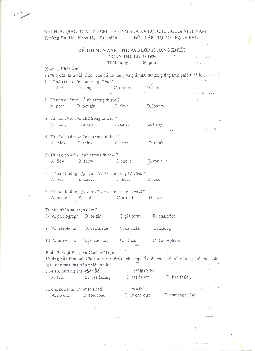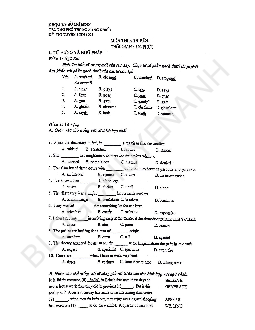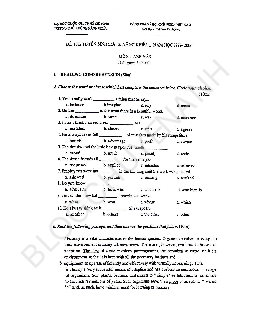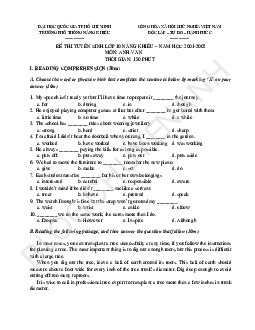






Preview text:
TRƯỜNG ĐẠI HỌC SƯ PHẠM HÀ NỘI TRƯỜNG THPT CHUYÊN
KÌ THI THỬ VÀO LỚP 10 THPT CHUYÊN NĂM 2021 LẦN 2
(Đề thi có 07 trang) Môn thi: TIẾNG ANH
(Dành cho thí sinh thi thử vào Chuyên Anh)
Thời gian làm bài: 120 phút (không kể thời gian phát đề)
Họ và tên thí sinh: ………………………………………… Mã đề thi: 241
Số báo danh: …………………………………………
Exercise 1: Mark the letter A, B, C or D on your answer sheet to indicate the word that differs from the
other three in the position of primary stress in each of the following questions.
Question 1. A. pedestrian B. embarrassed C. confusing D. picturesque
Question 2. A. lacquerware B. embargo C. handicraft D. buffalo
Question 3. A. independent B. illiterate C. self-disciplined D. spectacular
Exercise 2: Mark the letter A, B, C or D on your answer sheet to indicate the correct answer to each of
the following questions.
Question 4. We suggested that you_________ to the organization. A. admit B. admitting C. admitted D. be admitted
Question 5. They_________ the idea of celebrating the anniversary with a concert. A. lashed out B. hit upon C. made over D. phased out
Question 6. We had a _________ of a time at Jason's party yesterday. A. whole B. period C. week D. whale
Question 7. All that was left for breakfast were some_________ rolls and tea. A. sour B. stale C. rotten D. rancid
Question 8. The schoolboy’s excuse wasn’t _________ at all. Nobody in the classroom believed in the far- fetched story he told. A. credible B. creditable C. credulous D. credential
Question 9. Only thoroughly unpleasant people leave the _________ of their picnics to spoil the
appearance of the countryside. A. rester B. rest C. remains D. remainder
Question 10. The thief_________ into the house through a window. They were all closed.
A. mustn’t have gotten B. could have gotten C. can’t have gotten D. had gotten
Question 11. _________ for the director must have surprised you.
A. You are being nominated B. Your nominating C. You nominated
D. Your being nominated
Question 12. We have already discovered that there are many kinds of metals, _________ its special properties. A. each having B. which has C. everyone has D. having
Question 13. _________many times I tell him, he always never passes on phone message. A. Whenever B. No matter C. Whatever D. However
Exercise 3: Read the following passage and mark the letter A, B, C, or D on your answer sheet to
indicate the correct word or phrase that best fits each of the numbered blanks. There is an example at the beginning (0).
Trang 1/7 Mã đề 241 PEER PRESSURE
One of the (0.)---B--- influences on children today is that of their peers. What their classmates think, how
they dress and how they act in class and out of it affect the behaviour of nearly every child at school. In
their (14)___ not to be different, some children go so (15)___ as to hide their intelligence and ability in
case they are made fun of. Generally, children do not want to stand out from the crowd. They want to
(16)___ in, to be accepted. In psychological (17)___ the importance of peer pressure cannot be
overemphasised. There is a lot of evidence that it has great (18)___ on all aspects of children’s lives, from
the clothes they wear, the music they listen to and their (19)___ to study to their ambition in life, their
relationships and their (20)___ of self-worth. However, as children grow up into adolescents,
individuality becomes more acceptable, (21)___ even, and in their (22)___ for their own personal style,
the teenager and young adult will begin to experiment and be more willing to (23)___ the risk of rejection
by the group. Concern about intellectual prowess and achieving good exam results can dominate as the
atmosphere of competition develops and worries about the future (24)___ any fears of appearing too brainy.
Question (0). A. hardest B. strongest
C. heaviest D. fattest
Question 14. A. actions B. steps
C. efforts
D. measures Question 15. A. far B. much C. long
D. distant
Question 16. A. set B. fall C. fit D. get Question 17. A. words
B. points C. means D. terms
Question 18. A. standing
B. running
C. meaning D. bearing
Question 19. A. attitude
B. standing
C. opinion D. view
Question 20. A. impression
B. awareness C. sense
D. reaction
Question 21. A. desirable
B. bearable C. tolerable D. li keable
Question 22. A. search B. chase
C. course D. hunt Question 23. A. cope B. run C. carry D. bring
Question 24. A. overthrow
B. overflow
C. override
D. overbalance
Exercise 4: Mark the letter A, B, C or D on your answer sheet to indicate the word whose underlined
part differs from the other three in pronunciation in each of the following questions.
Question 25. A. attach B. chemistry C. architecture D. stomach
Question 26. A. counterfeit B. courtesy C. drought D. astound
Exercise 5: You are going to read a newspaper article. For questions 27-33, choose the answer (A, B, C
or D) which you think fits best according to the text.
THE SEARCH FOR ARTIFICIAL INTELLIGENCE
Robert Matthews, a leading UK researcher, outlines his mission
It is one of the most evocative phrases in the lexicon of science: artificial intelligence, “AI”, the creation of
machines that can think. Just the mention of it conjures up images of HAL, the all-too intelligent computer
in 2001: A Space Odyssey, and C3PO, the chatty, batty robot from Star Wars.
For over half a century, computer scientists have been working towards creating such machines, spending
billions of pounds in the attempt. And hanging over their efforts has been a challenge set by a British
mathematician widely regarded as the father of Alan research: Alan Turing.
During the 1930s, Turing showed, in theory at least, that a “universal machine” could be built, capable of
performing all the tasks of any special-purpose computing machine. After war-time work on code-
breaking, Turing helped to turn his discovery into the reality of an electronic computer. But he also
believed his proof meant that computers could mimic the action of the human mind.
Trang 2/7 Mã đề 241
In 1951, Turing published a prediction: by the end of the century, computers would be able to hold a five-
minute conversation with humans and fool 30 percent of them into believing they were dealing with another human being.
It is a deadline that has come and gone, along with huge amounts of funding. Yet no computer is remotely
close to passing the “Turing Test”. What went wrong? Why has no one succeeded in creating AI?
In fact, AI is already here, earning its keep in banks, airports, hospitals, factories- even our own home and
car. It may not be quite what many were led to expect, but then the story of real-life AI is one of misplaced
dreams, bitter feuds and grant-grabbing hype.
Today’s computer scientists divide into two broad camps on the issue of AI. The pragmatists see AI as a
means to creating machines that do for thinking what engines have done for physical labor- taking on tasks
we human would prefer not to do: spending endless hours scouring heaps of market data for trends or
scanning piles of medical images for signs of disease.
Then there are the visionaries, still wedded to Turing’s challenge and trying to bring the sci-fi image to
life. For them, AI is all about computerized “assistants” that solve your printer problems and cheeky-
chappy robots that talk to strangers. There are some who even see AI as the route to understanding the workings of the human mind.
Without doubt, it is the visionaries who have done most to get AI research on TV shows such as
Tomorrow’s World. It is the pragmatists, however, who have got AI out of the door and into successful
applications: the neural network cooking controls of microwave ovens, for example, or the expert system
that vets credit card transactions.
When current AI technology is pushed closer to its sci-fi image, the results can be more irritating than
impressive: witness Microsoft’s Paperclip Assistant, and the AI -based “help-desks” of some high-tech
companies. Even now, 50 years after work began on intelligent machines, only the bravest customers trust
the automated telephone ticketing system at their local cinema.
Even so, visionary AI researchers working away from the mainstream have pulled off some striking
achievements. Herbert Simon’s 1957 prediction that a computer would make a mathematical discovery
came to pass 20 years later, when a logic-based program named AM, developed by Douglas Lenat at
Stanford University, discovered that every even number greater than four seemed to be the sum of two odd
primes. In fact, AM had been pipped to this discovery by the Prussian mathematician Christian Goldbach
in the 18th century; nevertheless the rediscovery of “Goldbach’s Conjuecture” by AM caused a stir within the AI community.
Simon’s prediction that a computer would become world chess champion also came to pass- in a manner of
speaking- in 1997, when IBM’s Deep Blue computer beat Garry Kasparov, the greatest human exponent of the game.
Most likely it will be one of the AI visionaries who finally creates a computer that passes Turing’s 50-year-
old test. For many in the mainstream AI community, however, beating the Turing Test is viewed as little
more than a party trick. They are hard at work addressing far more basic issues in AI- like convincing
computers to hand over the cinema tickets you’ve paid for.
Question 27. According to the writer, the term “artificial intelligence” ____________.
A. is missing from some scientific dictionaries
B. makes us think of machines from sci-fi films
C. is overused among computer scientists
D. implies that computers can be too clever
Question 28. Turing believed that ____________.
A. computers could copy human thought processes
B. computer research needed more funding
C. computers would eventually replace human beings D. computers might be used for immoral purposes
Trang 3/7 Mã đề 241
Question 29. Computer scientists today ____________.
A. do not distinguish between sci-fi and reality
B. are making our dreams come true
C. do not agree about the aims of AI development
D. are spending far too long on AI research
Question 30. What is the writer’s view of the Microsoft Paperclip assistant?
A. It is a very helpful device.
B. It is not to be trusted.
C. It is an impressive development.
D. It is rather annoying.
Question 31. The discovery made by Lenat’s computer program ____________.
A. went against 18th century mathematical theory
B. was greeted with excitement by AI researchers
C. showed predictions about AI to be false
D. enabled it to win games like chess
Question 32. According to the writer, what do many mainstream AI researchers think is most important?
A. inventing a computer to beat the Turning test
B. developing computers to become chess champions
C. improving computerized services in daily life
D. creating computers for entertainment purposes
Question 33. The word “mimic” used in the passage is closest in meaning to ___________. A. imitate B. disregard C. take on D. take over
Exercise 6: Read the text below and think of ONE word which best fits each gap. Write your answers in
the corresponding numbered boxes on the answer sheet. There is an example at the beginning (0). DO I LOOK OK?
Dolls and plenty of toys were once (0.)--- the --- sole requirement for a happy childhood. Not any
(34.)_________. These days, style matters even in the playground, which means that an image obsession
can strike (35.)_________ children are barely out of nappies. Eavesdrop on a conversation at a primary
school and it is just (36.)_________ likely to revolve around the latest fashions as favorite cartoon
characters. But (37.)_________ is the darker side to this preoccupation with appearance that is causing
concern among some experts. Research carried (38.)_________ over the past two years has highlighted a
dangerous body-image trend in children as young as three and four. (39.)_________ dissatisfied are some
with how they look that they are prepared to diet and restrict (40.)_________ food intake in order to
change their appearance. A degree of weight awareness is evident (41.)_________ the age of two upwards,
and by the time they start school, many children have developed definite insecurities about how they
(42.)_________ perceived. Significantly, the children who are most concerned (43.)_________ weight are
almost consistently those whose parents are most controlling about what is eaten at home.
Exercise 7: The Reading Passage has seven paragraphs A-G. Choose the correct heading for each
paragraph from the list of headings below. Write the correct number (i-x) in boxes 44-50 on your answer sheet. List of Headings
i. The problem of dealing with emergencies in space
ii. How space biomedicine can help patients on Earth
iii. Why accidents are so common in outer space
iv. What is space biomedicine?
v. The psychological problems of astronauts
vi. Conducting space biomedical research on Earth
vii. The internal damage caused to the human body by space travel
viii. How space biomedicine first began
ix. The visible effects of space travel on the human body
x. Why space biomedicine is now necessary
Trang 4/7 Mã đề 241 44. Paragraph A _____________ 45. Paragraph B _____________ 46. Paragraph C _____________ 47. Paragraph D _____________ 48. Paragraph E _____________ 49. Paragraph F _____________ 50. Paragraph G _____________
SPACE TRAVEL AND HEALTH
A. Space biomedicine is a relatively new area of research both in the USA and in Europe. Its main
objectives are to study the effects of space travel on the human body, identifying the most critical
medical problems and finding solutions to those problems. Space biomedicine centres are receiving
increasing direct support from NASA and/or the European Space Agency (ESA).
B. This involvement of NASA and the ESA reflects growing concern that the feasibility of travel to
other planets, and beyond, is no longer limited by engineering constraints but by what the human
body can actually withstand. The discovery of ice on Mars, for instance, means that there is now no
necessity to design and develop a spacecraft large and powerful enough to transport the vast
amounts of water needed to sustain the crew throughout journeys that may last many years.
Without the necessary protection and medical treatment, however, their bodies would be devastated
by the unremittingly hostile environment of space.
C. The most obvious physical changes undergone by people in zero gravity are essentially harmless; in
some cases they are even amusing. The blood and other fluids are no longer dragged down towards
the feet by the gravity of Earth, so they accumulate higher up in the body, creating what is
sometimes called “fat face”, together with the contrasting “chicken legs” syndrome as the lower limbs become thinner.
D. Much more serious are the unseen consequences after months or years in space. With no gravity,
there is less need for a sturdy skeleton to support the body, with the result that the bones weaken,
releasing calcium into the bloodstream. This extra calcium can overload the kidneys, leading
ultimately to renal failure. Muscles too lose strength through lack of use. The heart becomes
smaller, losing the power to pump oxygenated blood to all parts of the body, while the lungs lose
the capacity to breathe fully. The digestive system becomes less efficient, a weakened immune
system is increasingly unable to prevent diseases and the high levels of solar and cosmic radiation
can cause various forms of cancer.
E. To make matters worse, a wide range of medical difficulties can arise in the case of an accident or
serious illness when the patient is millions of kilometres from Earth. There is simply not enough
room available inside a space vehicle to include all the equipment from a hospital’s casualty unit,
some of which would not work properly in space anyway. Even basic things such as a drip depend
on gravity to function, while standard resuscitation techniques become ineffective if sufficient
weight cannot be applied. The only solution seems to be to create extremely small medical tools
and “smart” devices that can, for example, diagnose and treat internal injuries using ultrasound. The
cost of designing and producing this kind of equipment is bound to be, well, astronomical.
F. Such considerations have led some to question the ethics of investing huge sums of money to help a
handful of people who, after all, are willingly risking their own health in outer space, when so
much needs to be done a lot closer to home. It is now clear, however, that every problem of space
travel has a parallel problem on Earth that will benefit from the knowledge gained and the skills
developed from space biomedical research. For instance, the very difficulty of treating astronauts in
space has led to rapid progress in the field of telemedicine, which in turn has brought about
developments that enable surgeons to communicate with patients in inaccessible parts of the world.
To take another example, systems invented to sterilize waste water on board spacecraft could be
used by emergency teams to filter contaminated water at the scene of natural disasters such as
floods and earthquakes. In the same way, miniature monitoring equipment, developed to save
Trang 5/7 Mã đề 241
weight in space capsules, will eventually become tiny monitors that patients on Earth can wear
without discomfort wherever they go.
G. Nevertheless, there is still one major obstacle to carrying out studies into the effects of space travel:
how to do so without going to the enormous expense of actually working in space. To simulate
conditions in zero gravity, one tried and tested method is to work under water, but the space
biomedicine centres are also looking at other ideas. In one experiment, researchers study the
weakening of bones that results from prolonged inactivity. This would involve volunteers staying in
bed for three months, but the centre concerned is confident there should be no great difficulty in
finding people willing to spend twelve weeks lying down. All in the name of science, of course.
Exercise 8: For questions 51-60, read the text below. Use the word given in capitals in brackets to form
a word that fits in the space in the same line. There is an example at the beginning (0). Write your
answers in the corresponding numbered on the answer sheet
Frankenstein's Real Creator
In these days of (0. GENE) ---genetic--- engineering, it is not unusual to hear the name Frankenstein
invoked by those who fear the consequences when humans seek to create a being in their own
(51.LIKE)________________.
Often overlooked, however, is the fact that the tale originated, not as a folk legend, still less as a wildly
original film script, but as a literary (52.MASTER)________________. Even today, to read the chilling
story of an inventor and the uncontrollable monster he created is at once both a thought-provoking and an
(53.SETTLE)________________experience. What’s more, the (54.ENDURE)________________
popularity of the novel, and its modern- day relevance are all the more remarkable when we remember it
was written almost 200 years ago, by an 18-year-old woman called Mary Shelley. Over the decades.
(55.NUMBER)________________ films have attempted to capture the full horror of her story, but none
have come close to equalling the power of Mary Shelley’s frightening prose. Amongst
(56.ACADEMY)________________and commentators, Frankenstein has long been
(57.KNOWLEDGE)________________ as a powerful piece of gothic fiction, representing as it does an
(58.ORDINARY)________________fusion of contemporary philosophy literary skill and
(59.IMAGINE)________________vision. It is only recently, however, with increased media attention
devoted to the philosophical issues tier novel raises, that there has been a more general
(60.REVIVE)________________of interest in Mary herself.
Exercise 9: Fill in the blank with a suitable preposition or particle.
61. The police arrived immediately after the call and caught the burglar ___________ the spot.
62. How could you stand ___________ and watched him beat the children like that?
63. The only way one can tell the twins___________ is by their haircuts.
64. The doctor thinks he’ll pull ___________ now. His temperature has gone down.
65. When the police discovered his history of drunk driving, they took ___________ his driver’s license.
Exercise 10: In the passage below some lines are correct but some have a word that should not be there.
Indicate the correct lines with a tick (√). For the incorrect lines, write the words that should not be there.
66. _____ During my stay among the indigenous people of Africa turned out to be a mixture of both
67. _____ success and failure. I was able to observe firsthand how the people who lived instead of relying
68. _____ on books or films. I was pleasantly surprised to find out that they were genial people. They were
69. _____ friendly to me from the very first day and they did not display any signs of hostility throughout
70. _____ my month – long stay. I felt indignant about when I thought of the terrible way they had always
71. _____ been depicted as in films and books.
Trang 6/7 Mã đề 241
72. _____ However, my trip was not a bed full of roses. I had been warned by my colleagues that when I
73. _____ stayed with a tribe, I had to do as the Romans do. I should not be afraid that to try new things
74. _____ especially the food that they considered delicacies. Unfortunately, I did not take up their
75. _____ advice and I gagged on a piece of meat that they offered me. They looked like offended and
from that day, many of them were not as friendly as they used to be.
Exercise 11: Complete the second sentence, using the word given so that it has a similar meaning to the
sentence printed before. Write between THREE and EIGHT words, including the word given in
brackets, in the space provided on the answer sheet. Do not change the word given in the brackets in any way.
Write your answer in the corresponding numbered boxes on the answer sheet.
76. Police reported that a man had been helping them with their inquiries. (WAS)
A man _________________________________police with their inquiries.
77. All the witnesses said that the accident was my fault. (BLAME)
All the witnesses said that___________________________ the accident.
78. It was childish of him not to accept my apologies. (REFUSED)
He _________________________________________________ of him.
79. No one listened to what the politician was saying last night. (EARS)
What ____________________________________________ last night.
80. She thought it was too difficult for her to come to the class on time. (FOUND)
She _______________________________________ the class on time.
Exercise 12: Finish each of the following sentences in such a way that it means exactly the same as the sentence printed before it.
Write your answer in the corresponding numbered boxes on the answer sheet.
81. We couldn’t relax until all the guests had gone home.
Only _________________________________________________________________.
82. His second attempt on the world record was successful.
He broke ______________________________________________________________.
83. I write to him almost every day.
Hardly ________________________________________________________________.
84. The northwest of Britain has more rain each year than the southeast.
The annual _____________________________________________________________.
85. It was an impressive building but it wasn’t to my taste.
Impressive ________________________________________________________________.
Exercise 13: Write a paragraph of around 140 words about the following topic:
“Ecotourism is now defined as responsible travel to natural areas that conserves the environment.”
What are the advantages of ecotourism?
-------------------THE END-----------------
Ghi chú: Thí sinh không được phép sử dụng tài liệu. Cán bộ coi thi không giải thích gì thêm
Họ và tên thí sinh: _________________________________ Số báo danh: _________________
Trang 7/7 Mã đề 241




